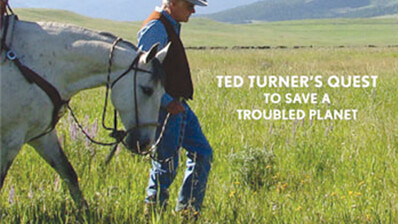Exclusive: Ted Turner Talks Montana, Bison, Capitalism & The Book Last Stand
Friday Oct. 31st, 2014
I’ll be honest: I never knew what to make of Ted Turner. I would hear of “Ted sightings” in Bozeman, but I never met the man myself. Now I feel like I’ve had a long conversation with Montana’s most famous and controversial billionaire “bison baron.”
Todd Wilkinson’s incredibly entertaining book, “Last Stand: Ted Turner’s Quest to Save a Troubled Planet” was the recent One Book—One Bozeman selection made by the Bozeman Public Library Foundation. Works are selected based on the premise that they’re worthwhile volumes everyone in the community should read. “Last Stand” is out this autumn in paperback. It’s a fascinating profile of Turner who, in midlife, bought a huge ranch outside Bozeman, the Flying D, and made life-changing decisions that established him as arguably the foremost “eco-capitalist” in the world today.
Over the course of the last several months, copies of “Last Stand” found their way to every member of Congress and all of the nearly 200 ambassadors to the United Nations. The book is touted by part-time Montanan Tom Brokaw, Terry Tempest Williams, E.O. Wilson and Bozeman’s own David Quammen.
I enjoyed reading the book because there’s so much I didn’t know about Turner. I wasn’t aware of how Turner connects us to so many larger issues in the world, such as the species extinction crisis, the role of the UN, and the looming threats of nuclear weapons and, potentially nuclear terrorists.
From his Bozeman ranch, Turner has built the largest bison herd in the world and he’s been the major catalyst in helping to recover the species. He’s welcomed back wolves and grizzlies to the Flying D and he is considered a major figure in
the conservation biology movement called “rewilding.”
DANIEL SMITH: Are you surprised by all of the positive attention Last Stand has received?
TED TURNER: The response has been satisfying. I didn’t try to shape the direction of the book or tell Todd how to write it. I told him that I would be as open and honest as possible and sometimes he really pushed me to open up. Some of the details about me are easier to read in the book than talk about publicly. It gets into parts of my personal life that wasn’t easy to share.
DS: When you’re in Montana, you live just up the road from Yellowstone. Do you ever go there? In Wilkinson’s book it says that the Flying D today holds all of the major mammals and birds that also live in the national park. That’s quite a feat.
TT: How can you not love Yellowstone? When Jane [Fonda] and I were together, we went down there and visited the wolves in Lamar Valley before they were turned loose. In fact, I hired away the park superintendent Mike Finley and the park’s wolf biologist, Mike Phillips, and convinced them to come work for me. (Today, Finley oversees the Turner Foundation and Phillips is also an elected state senator in the Montana legislature). This past summer, my family came out and we had a week long vacation together in Yellowstone. Like I said, I love Yellowstone. To be honest, I’ve also used it as kind of a measuring stick. If Yellowstone can be a home to all of that wildlife, I wondered why my ranches can’t do the same? Well, I’m proud to say they have!
DS: With the diversity of wildlife on your property, which animal would you rather be—a wolf, a bison, or a grizzly?
TT: You know, I have a feeling of connection to bison and I enjoy seeing bears, but if I had to be an animal, I’d be a wolf. I’ve howled to wolves right off the back deck of my ranch house and they’ve answered.
DS: Some business people and politicians see you as being an important figurehead. E.O.Wilson noted ‘you’re proof that capitalism and environmentalism can be joined to major humanitarian effect.’ What does being an eco-capitalist mean to you?
TT: We’re all part of the problems facing the world but the good news is together we can be the solution. Taking personal responsibility for your actions. Don’t make environmental messes that harm other people or require society to clean up. You make and save a lot more money over the long term by preventing or avoiding the destruction of the earth rather than cleaning up a mess or adapting to a catastrophe you caused.
DS: What’s still left to be done?
TT: Everything. We need to eradicate apathy. Just look at the world. Some of it is falling apart. We need to have faith in our young people and older Americans need to come out of their retirement and chip in as mentors. As I say in the book, it’s time to rally. I don’t pay much attention to pessimists. I’ll be an optimist until the end. I owe my grandkids hope. What needs to happen is people from around the world coming together to start a ‘Smart Movement.’ We would commit ourselves to stop doing so many dumb avoidable things and start making smarter choices. That’s not very complicated, is it?
Daniel J. Smith is a Bozeman Geologist/Filmmaker and Publisher. His graduate geology work was done in the Tetons, and he has a unique scientific knowledge of Yellowstone. His new website ThisIsYellowstone.com will be launched in early 2015.
| Tweet |